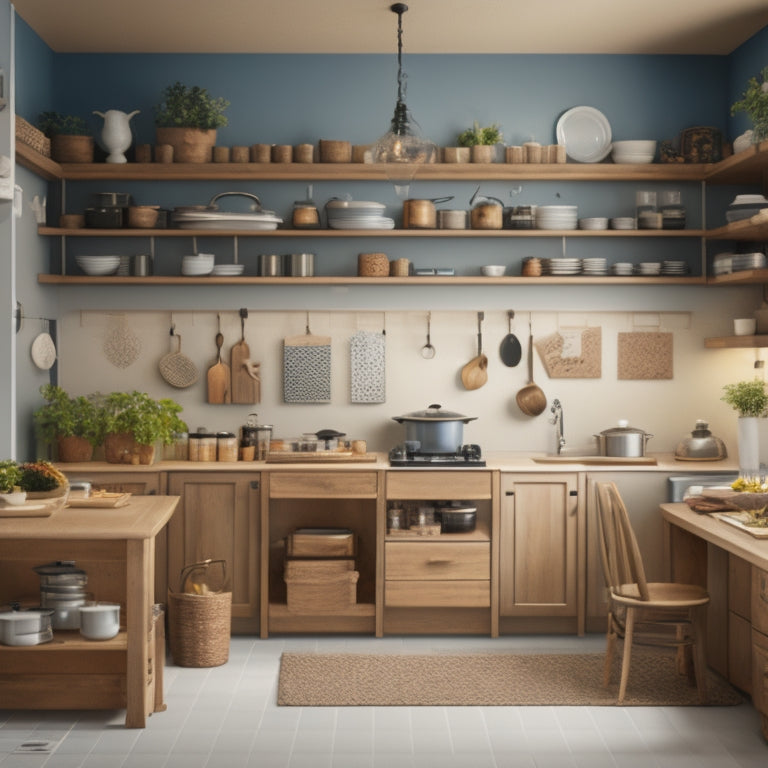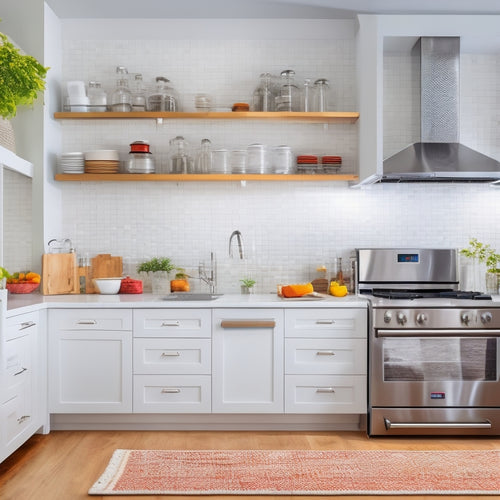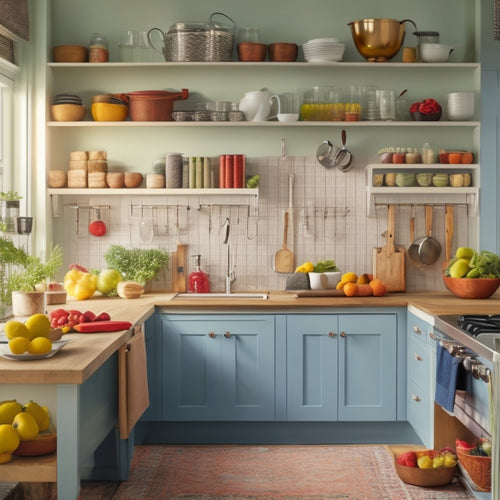
Crafting a Winning Business Blueprint for Kitchen Stores
Share
You're about to invest heavily in your kitchen store, and without a solid business blueprint, you're flying blind. To craft a winning plan, start by establishing your mission, vision, and objectives. Then, conduct a thorough market analysis to understand your target customers, competitors, and market trends. Identify your unique value proposition and develop a detailed plan that outlines staffing, equipment, and supply chain needs. Forecast financial success by projecting sales, investments, and costs, and analyze your competitors' pricing and marketing strategies. With a well-structured plan in place, you'll be ready to execute with confidence and make informed decisions to drive your kitchen store's success forward.
Key Takeaways
• Define a unique value proposition for your kitchen store, highlighting its competitive advantage in the market.
• Conduct thorough market analysis to identify target customers, competitors, and market trends in the kitchen industry.
• Develop a comprehensive plan outlining staffing, equipment, and supply chain needs for your kitchen store.
• Create financial projections for revenue, expenses, and cash flow, anticipating sales trends and potential risks.
• Establish milestones for successful execution, tracking progress, and making adjustments as needed to stay on course.
Building a Solid Foundation
To craft a winning business blueprint for your kitchen store, start by building a solid foundation that outlines your business's mission, vision, and objectives, which will serve as the guiding principles for your entire operation. This foundation will help you establish credibility with customers, investors, and partners.
Conducting a thorough market analysis is essential at this stage, as it will provide valuable insights into your target customers, competitors, and market trends. By understanding your market, you'll be able to develop a unique value proposition that sets your kitchen store apart from the competition.
A solid foundation will also enable you to create a clear and focused strategy, ensuring your business stays on track and achieves its goals.
Crafting a Comprehensive Plan
With your solid foundation in place, you're now ready to craft a detailed plan that outlines the specifics of your kitchen store's operations, management, and financial projections. This thorough plan will serve as a roadmap for your business, guiding you through the challenges and opportunities that lie ahead.
| Plan Component | Description | Importance |
| Market Analysis | Identify target customers, market trends, and competitor strengths/weaknesses | Understand your competitive landscape |
| Operational Plan | Outline staffing, equipment, and supply chain needs | Ensure efficient operations |
| Management Structure | Define roles, responsibilities, and decision-making processes | Establish clear leadership |
| Competitive Landscape | Analyze competitors' pricing, products, and marketing strategies | Stay ahead of the competition |
| Risk Management | Identify potential risks and develop contingency plans | Mitigate potential threats |
Forecasting Financial Success
You're now ready to forecast financial success by projecting accurate sales, investments, and costs, which will serve as a financial roadmap for your kitchen store's growth and profitability. This involves creating financial projections that outline revenue, expenses, and cash flow.
By doing so, you'll be able to identify opportunities for strategic growth and potential risks that need to be mitigated. Revenue forecasting will help you anticipate sales trends and adjust your pricing strategies accordingly. Meanwhile, risk assessment will enable you to prepare for unexpected challenges and make informed decisions.
With a solid financial forecast, you'll be well-equipped to drive your kitchen store towards sustainable success.
Writing a Winning Blueprint
Crafting a winning business blueprint for your kitchen store requires a detailed and well-structured plan that outlines your business goals, strategies, and action plans. You'll need to conduct a thorough market analysis to identify your target customers and competitors, as well as determine your competitive advantage. This will help you develop a strategic positioning that sets your store apart from the rest.
Executing With Confidence
Now that you've crafted a winning business blueprint, it's time to put your plan into action by allocating resources, assigning responsibilities, and establishing milestones to guarantee its successful execution.
To execute with confidence, you'll need to make strategic decisions about where to allocate your time, money, and energy. This requires confident decision making, backed by data and analysis.
By breaking down your plan into manageable tasks and deadlines, you'll be able to track your progress and make adjustments as needed. Strategic execution is key to turning your vision into reality.
Stay focused, stay disciplined, and you'll be on your way to achieving your business goals. Remember, confident decision making and strategic execution are the keys to accessing your kitchen store's full potential.
Frequently Asked Questions
How Do I Ensure My Business Plan Stays Relevant in a Changing Market?
You guarantee your business plan stays relevant by regularly conducting market analysis to identify trends and shifting customer preferences, demands, and needs, allowing you to adapt and refine your strategy for sustained success.
What Are the Most Critical Metrics to Track for Kitchen Store Success?
'You track what matters, and for kitchen stores, it's 65% of customers returning due to quality service. Focus on customer retention, sales growth, and monitor metrics like average order value, customer lifetime value, and inventory turnover to guarantee long-term success.'
Can I Use My Business Plan to Secure Partnerships With Suppliers?
You can leverage your business plan to secure partnerships with suppliers by showcasing a solid market analysis, financial projections, and growth strategy, effectively demonstrating your kitchen store's potential and value to suppliers during supplier negotiations for strategic partnerships.
How Often Should I Review and Update My Kitchen Store Business Plan?
Like a navigator adjusting course, you should review and update your business plan quarterly to guarantee market adaptation, reflecting shifts in customer needs, competitor moves, and industry trends, keeping your kitchen store ahead of the curve.
Are There Any Specific Certifications or Licenses Required for Kitchen Stores?
You'll need to research license requirements for your kitchen store, such as food service permits, and explore certification processes, like NSF International or UL certification, to guarantee compliance and demonstrate expertise.
Related Posts
-

Optimize Your Kitchen Storage With 7 Simple Hacks
You're already wasting valuable kitchen space without realizing it, and it's likely due to a lack of strategic storag...
-

5 Best Kitchen Organization Templates With Shopping Lists
You're looking to transform your kitchen into a culinary haven with the help of organization templates and shopping l...

